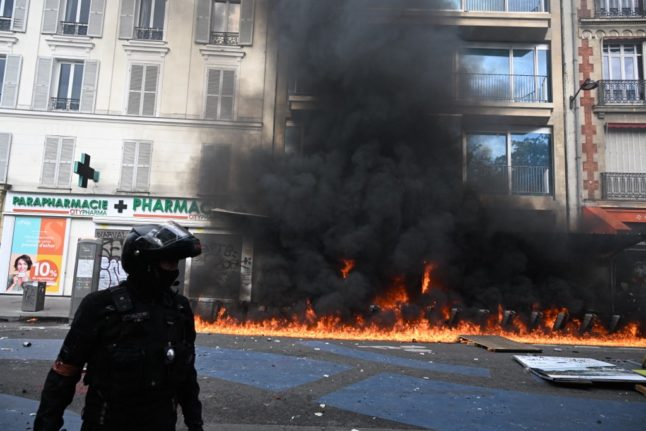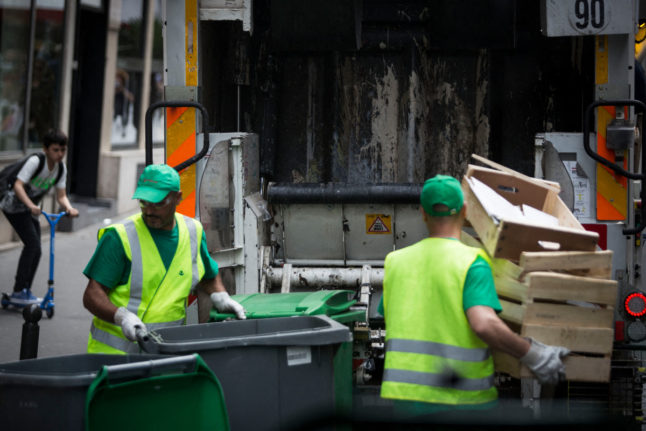Interior Minister Gérald Darmanin announced on Tuesday morning that 406 officers were injured during the protests across the country including 305 in Paris alone.
Such a high toll of injured police officers was “extremely rare” for a May 1st protest day, he said.
“The vast majority of protesters were peaceful, but in Paris, Lyon and Nantes notably, police officers came up against extremely violent rioters (casseurs) who had one objective: kill a police officer and to attack the property of others,” Darmanin said.
One policeman who was hit by a Molotov cocktail suffered burns to the face and hands but his life was not in danger.
The interior ministry also said there were 540 arrests made across the country on Monday including 305 in Paris.
Des policiers prennent feu après le jet d'un cocktail molotov. Affrontements très intenses à Paris@LucAuffret pour @LibreQg#ReformesDesRetraites #1ermai pic.twitter.com/9TjoNryQDV
— QG le média libre (@LibreQg) May 1, 2023
Across France almost one million people took to the streets on May 1st, although most of the protesters were peaceful, violent erupted in cities including Paris, Toulouse, Lyon and Nantes.
In Paris 90 several police officers were hospitalised – including one who received serious burns from a Molotov cocktail and one who was knocked unconscious after being hit with a paving stone.
A minority of protesters smashed shop windows and street furniture and set fires – including setting a row of Vélib’ hire-bikes on fire, causing damage to the building behind.
🔴 Très violent incendie en cours. Tensions. #1erMai #Paris pic.twitter.com/mQUYIcsNS5
— Clément Lanot (@ClementLanot) May 1, 2023
Unions had been hoping for a vast turnout at the dozens of demos across France, with Emmanuel Macron’s deeply unpopular pension reform remaining the focus of the protests.
Macron last month signed a law to raise the retirement age from 62 to 64, despite months of strikes against the bill.
“The law has been passed but has not been accepted, there is a desire to show discontent peacefully to have a reaction in response that shows a certain level of decency,” said Celine Bertoni, 37, an academic in the central city of Clermont-Ferrand.
“I still hope that we are going to be told it will be withdrawn,” she added.
“Macron has the impression that as he was elected he has all the power! But I want him to cede his place to the people,” added Karine Catteau, 45, in the western city of Rennes.
The main march in Paris kicked off at 2pm along the traditional protest route of Place de la Republique to Place de la Nation, with a heavy downpour suddenly beginning at the very moment it started.
Police had been given a last-minute go-ahead to use drones as a security measure after a Paris court rejected a petition from rights groups for them not to be used.
Once the main march in Paris ended, police used water canon and rubber bullets at Place d’Italie.
🔴 Affrontements à #Paris : utilisation du canon à eau. #1erMai
La situation ne se calme pas. pic.twitter.com/YUHYTUI3jO
— Clément Lanot (@ClementLanot) May 1, 2023
May 1 protests in Paris quickly spiralled out of control as so-called "casseurs" or thugs turned out en force and started throwing projectiles at police who responded by charging. Outside my flat. As usual. #ReformeDesRetraites #1erMai2023 pic.twitter.com/RJL5khnUtb
— Nina Lamparski (@ninaism) May 1, 2023
Police used tear gas in Toulouse in southern France as tensions erupted during the demonstrations, with two officers injured after paving stones were thrown.
Tear gas was also used in Rennes, while a car was set on fire in the southeastern city of Lyon and in Marseille demonstrators invaded the Hotel Intercontinental in the city centre.
In the western city of Nantes, police also fired tear gas after protesters hurled projectiles, AFP correspondents said. The windows of Uniqlo clothing store were smashed.
Prime minister Elisabeth Borne slammed the violence as “unacceptable”, tweeting: “In many cities in France, this May Day was a moment for responsible mobilisation and commitment. The scenes of violence on the sidelines of the
demonstrations are all the more unacceptable.”
Macron and his government have tried to turn the page on the episode of popular discontent, one of the biggest challenges to his second term.
“The page is not going to be turned as long as there is no withdrawal of this pension reform. The determination to win is intact,” said the head of the CGT union Sophie Binet at the Paris protest.
“The mobilisation is still very, very strong,” added Laurent Berger, head of the CFDT union.
“It is a sign that resentment and anger are not diminishing.”
The Interior ministry said that 782,000 people took to the streets around France, with the CGT union claiming 2.3 million protesters. The interior ministry’s figures show the largest May Day turnout in France since 2002 – the year when the country was poised for a presidential election second round between Jacques Chirac and Front National leader Jean-Marie Le Pen.
Radical ecological activists from Extinction Rebellion earlier sprayed orange paint on the facade of the glitzy Fondation Louis Vuitton museum in Paris, which is backed by the LVMH luxury goods giant.
🔴 Les militants de Extinction Rébellion recouvrent de peinture la fondation Louis Vuitton.
Action « contre les riches » en solidarité avec les travailleurs pour la journée du #1erMai. pic.twitter.com/zALbr9uJ21
— Clément Lanot (@ClementLanot) May 1, 2023
In a separate action by a different environmental protest group, activists sprayed orange paint around the Place Vendome in central Paris, known for its jewellery shops, targeting the facade of the ministry of justice.



 Please whitelist us to continue reading.
Please whitelist us to continue reading.
A journalist’s personal opinion should be invisible in true news journalism. The quotes in this piece are all opinions of the union spokespersons and demonstrators. Obviously, the article reflects the sympathies and opinion of the writer. I’m surprised she didn’t seek a statement from whomever smashed the windows of the Uniqlo store or set the car on fire.
If those were “peaceful protests” I dread to think what the unions would describe as violent.